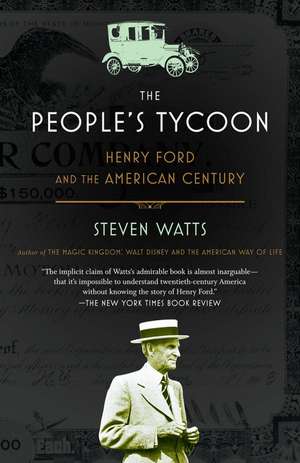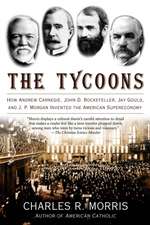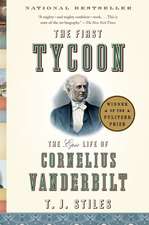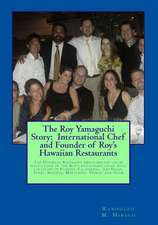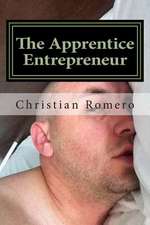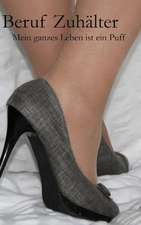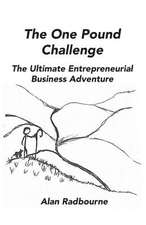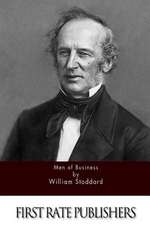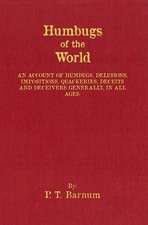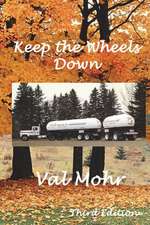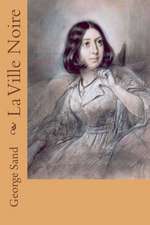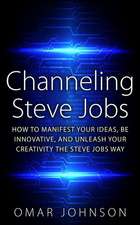The People's Tycoon: Henry Ford and the American Century
Autor Steven Wattsen Limba Engleză Paperback – 30 sep 2006
The real Henry Ford was a tangle of contradictions. He set off the consumer revolution by producing a car affordable to the masses, all the while lamenting the moral toll exacted by consumerism. He believed in giving his workers a living wage, though he was entirely opposed to union labor. He had a warm and loving relationship with his wife, but sired a son with another woman. A rabid anti-Semite, he nonetheless embraced African American workers in the era of Jim Crow.
Uncovering the man behind the myth, situating his achievements and their attendant controversies firmly within the context of early twentieth-century America, Watts has given us a comprehensive, illuminating, and fascinating biography of one of America’s first mass-culture celebrities.
Preț: 116.63 lei
Nou
Puncte Express: 175
Preț estimativ în valută:
22.32€ • 23.22$ • 18.71£
22.32€ • 23.22$ • 18.71£
Carte disponibilă
Livrare economică 20 februarie-06 martie
Livrare express 06-12 februarie pentru 34.66 lei
Preluare comenzi: 021 569.72.76
Specificații
ISBN-13: 9780375707254
ISBN-10: 0375707255
Pagini: 614
Ilustrații: illustrations
Dimensiuni: 135 x 203 x 33 mm
Greutate: 0.6 kg
Editura: Vintage Books USA
ISBN-10: 0375707255
Pagini: 614
Ilustrații: illustrations
Dimensiuni: 135 x 203 x 33 mm
Greutate: 0.6 kg
Editura: Vintage Books USA
Notă biografică
Steven Watts is a professor of history at University of Missouri and the author of The Magic Kingdom: Walt Disney and the American Way of Life.
Extras
One
Farm Boy
By the early 1920s, Henry Ford may have been the most famous man in the world. His inexpensive, durable, and perky Model T had taken America by storm, and the pioneering industrialist had garnered enormous fame and wealth. The Ford visage seemed to appear everywhere, constantly. A torrent of interviews, newspaper stories, publicity handouts, advertisements, and popular biographies flooded into the public realm, carrying details of his life story and his comments on every imaginable topic. Often based on interviews with him, or legendary tales, these pieces told the story of Ford's life as he wanted it to be told.
They poured the events of Henry Ford's life into the mold of the American success story. This hoary genre dated back to Benjamin Franklin and his autobiography of the penniless, bright, and determined youth who had walked into colonial Philadelphia munching on bread rolls as the first step in his meteoric rise to distinction. Horatio Alger had updated it for the nineteenth century with popular novels such as Struggling Upward and Mark the Match Boy.
Now Ford sought to place himself squarely within this American mythology. His version of his life story could have been lifted from any one of Alger's cookie-cutter plots: the young man pursues his dream while others scoff, he undertakes a lonely journey from the country to the city in search of fulfillment, overcomes obstacles with a combination of pluck, determination, and talent, and finally rises to heights of achievement and prosperity. The Ford success story contained an additional element-the youthful hero had a stern father who was skeptical of the son's newfangled ambitions and sought to stymie his creativity.
The struggle against paternal authority, with its Oedipal overtones, became a key to Henry Ford's rendering of his own early life. His ghostwritten book, My Life and Work (1922), a runaway best-seller, particularly highlighted this theme. Designed by Ford to popularize his ideas and enhance his legend, the book related how his father, William, sought to discourage his interest in machines. "My father was not entirely in sympathy with my bent toward mechanics. He thought that I ought to be a farmer," Ford told readers. When he finally decided to leave the farm, "I was all but given up for lost." Ford added that his later experiments with the gasoline engine while he was an electrical engineer "were no more popular with the president of the company than my first mechanical leanings were with my father."
There was one problem, however, with this tale of triumph over overweening paternal domination: it was as much the product of Henry Ford's imagination as a picture of reality. The facts suggest a different story. Though tension between father and son certainly existed, its causes were more complex and its results much less melodramatic than the younger Ford related. In part, it resulted from clashing personalities and private needs. Henry Ford's oft-told tale of rebellion and triumph over his father reflected a fundamental trait in his personality: a deeply felt need to present himself as a self-reliant individual who fought to prevail against lesser opponents and skeptics.
But this embroidery also went beyond personal issues. It was rooted in far-reaching currents of historical change that were broadly social as well as narrowly personal. By the late nineteenth century, America's industrial revolution was expanding explosively and beginning to overwhelm the traditional rural republic. Ford's story of rebellion, flight, and triumph was told thousands of times over as hordes of young men fled the countryside and streamed into urban manufacturing centers. This tidal wave of change, of which young Ford was a part, produced the machine age. Its alien values and unfamiliar landscape exhilarated many younger men, but it unsettled, even frightened many older citizens.
The younger and elder Fords were caught up in this larger social dynamic of America in the late 1800s. As William Ford occasionally remarked, "Oh, Henry ain't much of a farmer. He is more of a tinkerer." The son's tale of struggle with his father was destined to take shape in the stark, melodramatic terms of authority challenged, defied, and finally overturned. Even if it was as much imagined as real, Henry Ford's story not only revealed the young innovator's state of mind but resonated with the kinetic energy generated by the larger remaking of the United States in this era.
B
In late July 1863, much of the United States still was abuzz with reports of unimaginable fighting and bloodshed seeping out from the small Pennsylvania town of Gettysburg, where, a few weeks before, Robert E. Lee's invasion of the North had been thwarted by the Union Army of the Potomac. Far away, in the hinterland of the fractured American republic, in the early-morning hours of July 30, a healthy son was born to William and Mary Ford in Greenfield township, near Dearborn, Michigan. They had married two years earlier, and their first child had died at birth in 1862. So this pregnancy had caused much anxiety, and the safe arrival of the infant was the source of much relief. The parents decided to name the boy Henry.
The child was born into a society barely emerged from the wilderness. Though Michigan had become a state in 1837, it remained predominantly a frontier area, sparsely settled with farmers who were beginning to hack their way through primeval forests of oak, elm, maple, ash, beech, basswood, and pine trees. By the 1840s and 1850s, the first signs of commercial endeavor had started to appear in the countryside. The Erie Canal had provided connections between the Great Lakes region and the Eastern port of New York City; later, the first primitive steamboats, turnpikes, and railroads moved into the interior of Michigan, carrying people and commercial goods. Detroit grew steadily, along with other trading towns such as Port Huron, Kalamazoo, Grand Rapids, Benton Harbor, and Ypsilanti. Agriculture remained the backbone of the state's economy, but by the 1850s timber harvesting, the fishing industry, and the mining of copper and iron ore were contributing significant wealth.
By the onset of the Civil War, Michigan stood as the embodiment of the nineteenth-century rural republic. With a population of roughly 750,000-immigration of large numbers of Irish and Germans had added to the stream of New Yorkers and New Englanders bringing settlers over its borders-the state presented a proud rural culture populated by self-reliant landowners and fiercely independent citizens. In the 1850s, like most of the Old Northwest, Michigan was swept up in antislavery politics and became a bastion of the new Republican Party, with its ideology of "free soil, free labor, free men." Staunchly Unionist during the Civil War, Michigan contributed ninety thousand troops to the federal armies; some fifteen thousand of them died from battlefield wounds or disease.
Henry Ford's childhood, which began in the heart of this great civil conflagration, typified rural Midwestern life in the mid-nineteenth century. In the hundreds of towns, villages, and rural communities scattered throughout the area bounded by the Great Lakes in the north and the Ohio River to the south, and the Appalachians and Great Plains to the east and west, life was shaped by local influences. Several threads-extended family connections, seasonal farm labor, community gatherings, church-came together in a tightly woven web of social experience. Young Henry, like any toddler on a busy farm, stayed close to his mother, but he could not avoid being immersed in nature, the seasonal rhythms of agricultural production, and the workaday calendar of providing shelter and sustenance. His first childhood memory invoked this rural quality of life:
The first thing that I remember in my life is my father taking my brother John and myself to see a bird's nest under a large oak log twenty rods east of our home and my birthplace. John was so young that he could not walk. Father carried him, [while] I being two years older could run along with them. This must have been about the year 1866 in June. I remember the nest with 4 eggs and also the bird and hearing it sing. I have always remembered the song and in later years found that it was a song sparrow.
As a boy, young Henry increasingly came into contact with the adult male world of farm work. William pursued the typical, varied activities of a self-sufficient farmer: growing wheat, corn, and hay; raising livestock and smoking meat; tending a fruit orchard; hunting and fishing; preserving vegetables in cellars over the winter; cutting firewood for domestic use and to sell in nearby Detroit for extra cash. Labor was long and hard, and, in the words of a Ford neighbor, farmers set off for their fields and "went to work from daylight to dark, and then went home and did their chores." Tagging along with his father, Henry lent a hand with planting and harvesting, caring for livestock, and doing various chores. Inevitably, contact with hard-bitten farmhands produced a comical initiation rite. At about age six, the youngster was resting with some of the laborers when one of them innocently offered him a plug of chewing tobacco. Ignorant of the proper procedure for leisurely mastication and spitting, he chewed up the potent concoction and then swallowed it. As the men laughed, the boy grew lightheaded and dizzy as he began walking woozily back toward the house. Sitting down by the creek near his home, he recalled much later, "I had the feeling that the water was flowing uphill." When he staggered in the door with his story, his mother burst into laughter but quickly reassured her son that he would be all right.
In January 1871, at age seven, Ford trooped off to the one-room Scotch Settlement School, about two miles from his house. He had been well prepared by his mother, who already had conveyed the rudiments of reading by teaching him the alphabet and patiently leading him through simple texts. Among his early school instructors were Frank R. Ward, a sharp-witted neighbor; Emily Nardin, a young woman who roomed with the Ford family for a short time; and John Brainard Chapman, a large, stout man whose intimidating physical presence made up for his intellectual shortcomings. According to John Haggerty, one of Ford's schoolmates, Chapman "could have told Henry and me everything he knew in 10 minutes. But he weighed 275 pounds and it was the weight that really counted."
Young Ford settled into the typical routine of provincial public schools. The children of all ages met regularly during the winter and rainy seasons, but adjourned for weeks during planting and harvesting periods. School days began, after the woodstove had been stoked, with the reading of a Bible verse and recitation of the Lord's Prayer. Teachers closely followed a basic curriculum of reading, writing, and arithmetic and drilled into the heads of their young charges standards of honor, hard work, and fair play. Sitting at a desk on a raised platform at the front of the room, the teacher called students forward to recite lessons orally or write them on blackboards. Teachers sought to enforce discipline and instill self-control as well as impart information. As Ford recalled, students who misbehaved were brought to the front of the room and "placed directly under the teacher's eye."
Henry was an expert prankster. With typical ingenuity, he once bored two small holes in the bottom of another student's seat. In one hole he hid a needle with the point up, and then ran a connecting string down through the other hole and under the bench to his seat. During a dead space in the school day, he yanked on the string, and the resulting howls brought peals of laughter from his classmates. He also proved to be a bright, if unexceptional, student who particularly excelled at "oral" arithmetic, or working out number problems in his head. His greatest achievements, however, came from mechanical tinkering. Sitting at his desk while classmates recited at the front of the room, he would prop up his geography book as a cover; behind it, he took apart classmates' watches and put them back together. Once Henry and his schoolboy pals built a dam of stones and mud on a small creek near the school and installed a primitive water wheel that turned as water flowed over the dam. At the end of the school day, however, they forgot their construction project, left it in place overnight, and flooded the neighboring farmer's potato field. Another time, Henry led the group in building a crude turbine steam engine. Using an old ten-gallon can for a boiler, they attached to it a short length of pipe for carrying steam to revolving tin blades. A roaring fire built enough steam pressure to turn the turbine very fast, but eventually the contraption exploded. The spewing steam and flying tin slightly injured the boys, including Henry, who was left with a lifelong scar on his cheek. As Ford recalled ruefully, the explosion "set the [school] fence on fire and raised ned in general."
Henry Ford commenced his lifelong friendship with Edsel Ruddiman, a neighbor boy, at the Scotch Settlement School. The two became nearly inseparable, and they spent much of their boyhood together. They played, walked, and talked nearly every day and carved their initials next to each other in the desk they shared. The two companions even went to church together on Sunday evenings-it was about a four-mile walk-even though neither was very religious. "It was more to be together," Ruddiman admitted. In later years, Ruddiman became a prominent pharmacist and chemist at the Ford Motor Company. When Henry's only child was born in 1893, he named him Edsel.
Away from the school, Henry Ford spent his boyhood in the comfortable atmosphere of a bourgeois home set in a typical Midwestern village. Henry, the eldest child, had been followed by a succession of five siblings who arrived like clockwork every other year: John in 1865, Margaret in 1867, Jane in 1869, William Jr. in 1871, and Robert in 1873. Domestic life for the Fords revolved around simple pleasures. After the workday was complete, parents and children read, played card games, sang traditional songs and simple hymns around the pump organ in the parlor, attended the Christ Episcopal Church in Dearborn on Sundays, and joined in neighborhood picnics and church socials. The Ford brothers jostled and engaged in harmless antics. When their father decreed that the easiest chores would go to the boy who first got out of the house in the morning, William Jr. once filled Henry's boots with applesauce to slow him down. As an adult, Henry jotted down impressions that still remained with him from boyhood: "Remember sleigh, wood hauling, cold winters, setting sun, sleighbell, long walks, cold weather, boys and girls."
Mary Ford, with her gentle but firm role in the household, provided the dominant influence in Henry's childhood. "Mother presided over it and ruled it but she made it a good place to be," he told many people in later years. He elevated her to near-sainthood in later life. Henry seemed especially struck by her moral influence. "I have tried to live my life as my mother would have wished," he told journalist Edgar Guest in 1923.
From the Hardcover edition.
Farm Boy
By the early 1920s, Henry Ford may have been the most famous man in the world. His inexpensive, durable, and perky Model T had taken America by storm, and the pioneering industrialist had garnered enormous fame and wealth. The Ford visage seemed to appear everywhere, constantly. A torrent of interviews, newspaper stories, publicity handouts, advertisements, and popular biographies flooded into the public realm, carrying details of his life story and his comments on every imaginable topic. Often based on interviews with him, or legendary tales, these pieces told the story of Ford's life as he wanted it to be told.
They poured the events of Henry Ford's life into the mold of the American success story. This hoary genre dated back to Benjamin Franklin and his autobiography of the penniless, bright, and determined youth who had walked into colonial Philadelphia munching on bread rolls as the first step in his meteoric rise to distinction. Horatio Alger had updated it for the nineteenth century with popular novels such as Struggling Upward and Mark the Match Boy.
Now Ford sought to place himself squarely within this American mythology. His version of his life story could have been lifted from any one of Alger's cookie-cutter plots: the young man pursues his dream while others scoff, he undertakes a lonely journey from the country to the city in search of fulfillment, overcomes obstacles with a combination of pluck, determination, and talent, and finally rises to heights of achievement and prosperity. The Ford success story contained an additional element-the youthful hero had a stern father who was skeptical of the son's newfangled ambitions and sought to stymie his creativity.
The struggle against paternal authority, with its Oedipal overtones, became a key to Henry Ford's rendering of his own early life. His ghostwritten book, My Life and Work (1922), a runaway best-seller, particularly highlighted this theme. Designed by Ford to popularize his ideas and enhance his legend, the book related how his father, William, sought to discourage his interest in machines. "My father was not entirely in sympathy with my bent toward mechanics. He thought that I ought to be a farmer," Ford told readers. When he finally decided to leave the farm, "I was all but given up for lost." Ford added that his later experiments with the gasoline engine while he was an electrical engineer "were no more popular with the president of the company than my first mechanical leanings were with my father."
There was one problem, however, with this tale of triumph over overweening paternal domination: it was as much the product of Henry Ford's imagination as a picture of reality. The facts suggest a different story. Though tension between father and son certainly existed, its causes were more complex and its results much less melodramatic than the younger Ford related. In part, it resulted from clashing personalities and private needs. Henry Ford's oft-told tale of rebellion and triumph over his father reflected a fundamental trait in his personality: a deeply felt need to present himself as a self-reliant individual who fought to prevail against lesser opponents and skeptics.
But this embroidery also went beyond personal issues. It was rooted in far-reaching currents of historical change that were broadly social as well as narrowly personal. By the late nineteenth century, America's industrial revolution was expanding explosively and beginning to overwhelm the traditional rural republic. Ford's story of rebellion, flight, and triumph was told thousands of times over as hordes of young men fled the countryside and streamed into urban manufacturing centers. This tidal wave of change, of which young Ford was a part, produced the machine age. Its alien values and unfamiliar landscape exhilarated many younger men, but it unsettled, even frightened many older citizens.
The younger and elder Fords were caught up in this larger social dynamic of America in the late 1800s. As William Ford occasionally remarked, "Oh, Henry ain't much of a farmer. He is more of a tinkerer." The son's tale of struggle with his father was destined to take shape in the stark, melodramatic terms of authority challenged, defied, and finally overturned. Even if it was as much imagined as real, Henry Ford's story not only revealed the young innovator's state of mind but resonated with the kinetic energy generated by the larger remaking of the United States in this era.
B
In late July 1863, much of the United States still was abuzz with reports of unimaginable fighting and bloodshed seeping out from the small Pennsylvania town of Gettysburg, where, a few weeks before, Robert E. Lee's invasion of the North had been thwarted by the Union Army of the Potomac. Far away, in the hinterland of the fractured American republic, in the early-morning hours of July 30, a healthy son was born to William and Mary Ford in Greenfield township, near Dearborn, Michigan. They had married two years earlier, and their first child had died at birth in 1862. So this pregnancy had caused much anxiety, and the safe arrival of the infant was the source of much relief. The parents decided to name the boy Henry.
The child was born into a society barely emerged from the wilderness. Though Michigan had become a state in 1837, it remained predominantly a frontier area, sparsely settled with farmers who were beginning to hack their way through primeval forests of oak, elm, maple, ash, beech, basswood, and pine trees. By the 1840s and 1850s, the first signs of commercial endeavor had started to appear in the countryside. The Erie Canal had provided connections between the Great Lakes region and the Eastern port of New York City; later, the first primitive steamboats, turnpikes, and railroads moved into the interior of Michigan, carrying people and commercial goods. Detroit grew steadily, along with other trading towns such as Port Huron, Kalamazoo, Grand Rapids, Benton Harbor, and Ypsilanti. Agriculture remained the backbone of the state's economy, but by the 1850s timber harvesting, the fishing industry, and the mining of copper and iron ore were contributing significant wealth.
By the onset of the Civil War, Michigan stood as the embodiment of the nineteenth-century rural republic. With a population of roughly 750,000-immigration of large numbers of Irish and Germans had added to the stream of New Yorkers and New Englanders bringing settlers over its borders-the state presented a proud rural culture populated by self-reliant landowners and fiercely independent citizens. In the 1850s, like most of the Old Northwest, Michigan was swept up in antislavery politics and became a bastion of the new Republican Party, with its ideology of "free soil, free labor, free men." Staunchly Unionist during the Civil War, Michigan contributed ninety thousand troops to the federal armies; some fifteen thousand of them died from battlefield wounds or disease.
Henry Ford's childhood, which began in the heart of this great civil conflagration, typified rural Midwestern life in the mid-nineteenth century. In the hundreds of towns, villages, and rural communities scattered throughout the area bounded by the Great Lakes in the north and the Ohio River to the south, and the Appalachians and Great Plains to the east and west, life was shaped by local influences. Several threads-extended family connections, seasonal farm labor, community gatherings, church-came together in a tightly woven web of social experience. Young Henry, like any toddler on a busy farm, stayed close to his mother, but he could not avoid being immersed in nature, the seasonal rhythms of agricultural production, and the workaday calendar of providing shelter and sustenance. His first childhood memory invoked this rural quality of life:
The first thing that I remember in my life is my father taking my brother John and myself to see a bird's nest under a large oak log twenty rods east of our home and my birthplace. John was so young that he could not walk. Father carried him, [while] I being two years older could run along with them. This must have been about the year 1866 in June. I remember the nest with 4 eggs and also the bird and hearing it sing. I have always remembered the song and in later years found that it was a song sparrow.
As a boy, young Henry increasingly came into contact with the adult male world of farm work. William pursued the typical, varied activities of a self-sufficient farmer: growing wheat, corn, and hay; raising livestock and smoking meat; tending a fruit orchard; hunting and fishing; preserving vegetables in cellars over the winter; cutting firewood for domestic use and to sell in nearby Detroit for extra cash. Labor was long and hard, and, in the words of a Ford neighbor, farmers set off for their fields and "went to work from daylight to dark, and then went home and did their chores." Tagging along with his father, Henry lent a hand with planting and harvesting, caring for livestock, and doing various chores. Inevitably, contact with hard-bitten farmhands produced a comical initiation rite. At about age six, the youngster was resting with some of the laborers when one of them innocently offered him a plug of chewing tobacco. Ignorant of the proper procedure for leisurely mastication and spitting, he chewed up the potent concoction and then swallowed it. As the men laughed, the boy grew lightheaded and dizzy as he began walking woozily back toward the house. Sitting down by the creek near his home, he recalled much later, "I had the feeling that the water was flowing uphill." When he staggered in the door with his story, his mother burst into laughter but quickly reassured her son that he would be all right.
In January 1871, at age seven, Ford trooped off to the one-room Scotch Settlement School, about two miles from his house. He had been well prepared by his mother, who already had conveyed the rudiments of reading by teaching him the alphabet and patiently leading him through simple texts. Among his early school instructors were Frank R. Ward, a sharp-witted neighbor; Emily Nardin, a young woman who roomed with the Ford family for a short time; and John Brainard Chapman, a large, stout man whose intimidating physical presence made up for his intellectual shortcomings. According to John Haggerty, one of Ford's schoolmates, Chapman "could have told Henry and me everything he knew in 10 minutes. But he weighed 275 pounds and it was the weight that really counted."
Young Ford settled into the typical routine of provincial public schools. The children of all ages met regularly during the winter and rainy seasons, but adjourned for weeks during planting and harvesting periods. School days began, after the woodstove had been stoked, with the reading of a Bible verse and recitation of the Lord's Prayer. Teachers closely followed a basic curriculum of reading, writing, and arithmetic and drilled into the heads of their young charges standards of honor, hard work, and fair play. Sitting at a desk on a raised platform at the front of the room, the teacher called students forward to recite lessons orally or write them on blackboards. Teachers sought to enforce discipline and instill self-control as well as impart information. As Ford recalled, students who misbehaved were brought to the front of the room and "placed directly under the teacher's eye."
Henry was an expert prankster. With typical ingenuity, he once bored two small holes in the bottom of another student's seat. In one hole he hid a needle with the point up, and then ran a connecting string down through the other hole and under the bench to his seat. During a dead space in the school day, he yanked on the string, and the resulting howls brought peals of laughter from his classmates. He also proved to be a bright, if unexceptional, student who particularly excelled at "oral" arithmetic, or working out number problems in his head. His greatest achievements, however, came from mechanical tinkering. Sitting at his desk while classmates recited at the front of the room, he would prop up his geography book as a cover; behind it, he took apart classmates' watches and put them back together. Once Henry and his schoolboy pals built a dam of stones and mud on a small creek near the school and installed a primitive water wheel that turned as water flowed over the dam. At the end of the school day, however, they forgot their construction project, left it in place overnight, and flooded the neighboring farmer's potato field. Another time, Henry led the group in building a crude turbine steam engine. Using an old ten-gallon can for a boiler, they attached to it a short length of pipe for carrying steam to revolving tin blades. A roaring fire built enough steam pressure to turn the turbine very fast, but eventually the contraption exploded. The spewing steam and flying tin slightly injured the boys, including Henry, who was left with a lifelong scar on his cheek. As Ford recalled ruefully, the explosion "set the [school] fence on fire and raised ned in general."
Henry Ford commenced his lifelong friendship with Edsel Ruddiman, a neighbor boy, at the Scotch Settlement School. The two became nearly inseparable, and they spent much of their boyhood together. They played, walked, and talked nearly every day and carved their initials next to each other in the desk they shared. The two companions even went to church together on Sunday evenings-it was about a four-mile walk-even though neither was very religious. "It was more to be together," Ruddiman admitted. In later years, Ruddiman became a prominent pharmacist and chemist at the Ford Motor Company. When Henry's only child was born in 1893, he named him Edsel.
Away from the school, Henry Ford spent his boyhood in the comfortable atmosphere of a bourgeois home set in a typical Midwestern village. Henry, the eldest child, had been followed by a succession of five siblings who arrived like clockwork every other year: John in 1865, Margaret in 1867, Jane in 1869, William Jr. in 1871, and Robert in 1873. Domestic life for the Fords revolved around simple pleasures. After the workday was complete, parents and children read, played card games, sang traditional songs and simple hymns around the pump organ in the parlor, attended the Christ Episcopal Church in Dearborn on Sundays, and joined in neighborhood picnics and church socials. The Ford brothers jostled and engaged in harmless antics. When their father decreed that the easiest chores would go to the boy who first got out of the house in the morning, William Jr. once filled Henry's boots with applesauce to slow him down. As an adult, Henry jotted down impressions that still remained with him from boyhood: "Remember sleigh, wood hauling, cold winters, setting sun, sleighbell, long walks, cold weather, boys and girls."
Mary Ford, with her gentle but firm role in the household, provided the dominant influence in Henry's childhood. "Mother presided over it and ruled it but she made it a good place to be," he told many people in later years. He elevated her to near-sainthood in later life. Henry seemed especially struck by her moral influence. "I have tried to live my life as my mother would have wished," he told journalist Edgar Guest in 1923.
From the Hardcover edition.
Recenzii
“The implicit claim of Watts’s admirable book is almost inarguable–that it’s impossible to understand 20th-century America without knowing the story of Henry Ford.” –The New York Times
“Ford has had many biographers. . . . None, however, comes close to Steven Watts. . . . He brilliantly reveals the nature of Ford’s genius.” –Chicago Tribune
“Steven Watts attempts the most integrated understanding to date of Ford’s enormous influence and varied appeal. . . . The fascinating result may change the way Henry Ford is remembered.” –San Francisco Chronicle
“Ford has had many biographers. . . . None, however, comes close to Steven Watts. . . . He brilliantly reveals the nature of Ford’s genius.” –Chicago Tribune
“Steven Watts attempts the most integrated understanding to date of Ford’s enormous influence and varied appeal. . . . The fascinating result may change the way Henry Ford is remembered.” –San Francisco Chronicle
Cuprins
PROLOGUE: The Legend of Henry Ford
PART ONE: The Road to Fame
One—Farm Boy
Two—Machinist
Three—Inventor
Four—Businessman
Five—Celebrity
Six—Entrepreneur
PART TWO: The Miracle Maker
Seven—Consumer
Eight—Producer
Nine—Folk Hero
Ten—Reformer
Eleven—Victorian
Twelve—Politician
PART THREE: The Flivver King
Thirteen—Legend
Fourteen—Visionary
Fifteen—Moralist
Sixteen—Positive Thinker
Seventeen—Emperor
Eighteen—Father
Nineteen—Bigot
PART FOUR: The Long Twilight
Twenty—Antiquarian
Twenty-one—Individualist
Twenty-two—Despot
Twenty-three—Dabbler
Twenty-four—Educator
Twenty-five—Figurehead
EPILOGUE: The Sage of Dearborn
Acknowledgments
Notes
Index
From the Hardcover edition.
PART ONE: The Road to Fame
One—Farm Boy
Two—Machinist
Three—Inventor
Four—Businessman
Five—Celebrity
Six—Entrepreneur
PART TWO: The Miracle Maker
Seven—Consumer
Eight—Producer
Nine—Folk Hero
Ten—Reformer
Eleven—Victorian
Twelve—Politician
PART THREE: The Flivver King
Thirteen—Legend
Fourteen—Visionary
Fifteen—Moralist
Sixteen—Positive Thinker
Seventeen—Emperor
Eighteen—Father
Nineteen—Bigot
PART FOUR: The Long Twilight
Twenty—Antiquarian
Twenty-one—Individualist
Twenty-two—Despot
Twenty-three—Dabbler
Twenty-four—Educator
Twenty-five—Figurehead
EPILOGUE: The Sage of Dearborn
Acknowledgments
Notes
Index
From the Hardcover edition.
Descriere
In this major new biography of one of the architects of modern America, Steven Watts shows readers an entrepreneur whose affordable car triggered the consumer revolution, but who, in his private life and public pronouncements, rejected consumerism.
